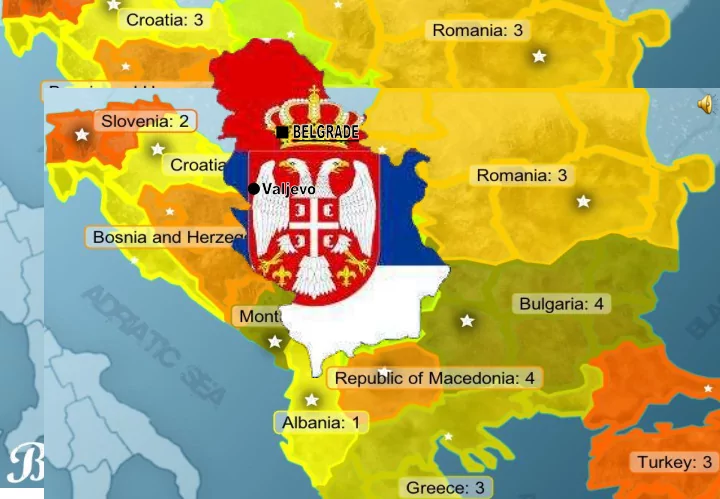

5 th October 1939, with a total of 47 students.. Over 74 years the school building has been changed, numbers of students have grown from year to year, as well as the number of educational profiles. In 2009/10 academic year the School became considerably involved in the VET Reform Programme. In March 2011 construction of the in-door school pool started. In May 2012 the School became one of the Centres for Continuous Adult Education. In 2011 the School received the Saint Sava award for special contribution to education development.
I sector: MECHANICAL ENGINEERING AND METAL PROCESSING • MECHANICAL ENGINEERING TECHNICIAN (IV) • MECHANICAL ENGINEERING TECHNICIAN FOR COMPUTER CONSTRUCTION (IV) • CAR MECHANIC (III) • INSTALLER (III)
II sector: ELECTRICAL ENGINEERING • ELECTRO-TECHNICIAN OF COMPUTERS (IV) • TECHNICIAN FOR MECHATRONICS (IV) • ADMINISTRATOR OF COMPUTER NETWORKS (IV) • ELECTRO-INSTALLER (III) •ЕLECTRO -MECHANIC FOR COOLING AND THERMIC DEVICES (III)
III sector: CONSTRUCTION • CONSTRUCTION TECHNICIAN FOR CONSTRUCTION WORKS (IV) • OPERATOR OF CONSTRUCTION MECHANISATION (III) • DECORATOR OF WALL SERVICES (III)
IV sector: TRAFFIC • TECHNICIAN FOR ROAD TRAFFIC (IV) • TECHNICIAN FOR TRAFFIC SAFETY (IV) • MOTOR VEHICLES DRIVER (III)
V sector: CHEMISTRY, NON-METALS AND GRAPHICS • PRINTING TECHNICIAN (IV)
PARTICIPATION in INTERNATIONAL PROJECTS Science and culture to youth Open sports field Friendship with Valjevo Education of students from Serbia for the needs of Gorenje factory International camp on Bager Lake in Ingolstadt VET Reform Programme Techno Eco A step further Step to new knowledge New step to modern technical knowledge Modernisation of the VET System ECO POOL
2008 - School Centre Velenje – Invitation for the 56 th public call for co- financing the pilot project for education of foreign citizens from the countries of the Western Balkans in secondary technical and vocational educational programmes in secondary schools in the Republic of Slovenia
2009, February 16 students of the third grade and 1 teacher spent 2 months in Slovenia (Velenje). The students attend: - intensive Slovenian language course - lessons of lab exercises - and of practice teaching. -participate in project development -learn about cultural and historical sites -use e-teaching project. The idea is developed into the project “Education of students from Serbia for the needs of Gorenje factory, gospodinjski appliences, d. d“ .
2009/2010 The group of students who previously spent time in Slovenia returns to Velenje again, accompanied by another group of teachers, this time for 2 months each during both terms. Development of the final part of the practical work and the final year students’ dance is attended by: - students’ parents - a group of thirty teachers
2010/2011 - Employment of the first graduates in “Gorenje” factory 2011/2012 The project “Education of students of the Western Balkans in Slovenia” -12 students continue their education in Velenje – all year – independently - Protocol on cooperation and improvement of relationships and mutual visits of students and teachers
2012/2013 - The same students continue their education and they graduate in Slovenia - 9 new students (III grade) enter the project - Joint project “New step to modern technical knowledge’’: - Transfer of good practice - Setting labs with knowledge technology - Implementation of seminars on all levels - Study visits - Electro-lab – joint equipping of demonstration desks - donation
Beginning of cooperation - Turkey - Other schools from the region - International competition in the sector of Mechanical Engineering “Balkan Junior“ Placement: - I place (team) - Stefan Pantelic - 100 points (knowledge test)
2013/2014 Extension of continuity: -9 students of IV grade continue education -6 students of III grade - ”Balkan Junior“ – competition (sector of Electrical Engineering) Velenje Extension of cooperation: -Serbia-Slovenia-Turkey -Serbia-Bosnia and Herzegovina -Montenegro – Macedonia - Turkey -Joining of other Western Balkans countries
Impressions: Benefits for students: - Content and ways of work in school - Habits, customs, their peers’ culture - Openness to research - Mobility - Friendship, socialising, cooperation in the future - Motivation of other students - Team work - Gaining security and self-confidence.. - More secure employment..
-Benefits for the school: - Networking of the teaching staff - Development of new teaching methods - Equipment consisting new teaching aids - Innovations - Networking and joining - Better everyday school life - Recognisible and interesting for future secondary students - Parents - Local community
Duration - 5 years already, -new contents, -Openness of the project for further development (continuation of education) – motivation of the state..
Recommend
More recommend